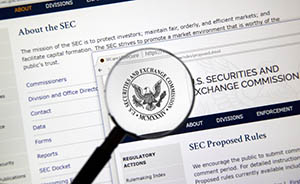The U.S. Securities and Exchange Commission (SEC) operates from its headquarters in Washington, D.C. and has 11 regional offices. It’s Division of Enforcement investigates cases and recommends to the Commission cases to be brought against individuals and entities. Investigations can begin through whistleblowers, news articles, referrals from other agencies, complaints from the public or data derived from market surveillance.
Enforcement can open a tentative inquiry known as a matter under inquiry (MUI) or a formal investigation. With an MUI, the staff usually sends a letter requesting information to the entity or person(s) they are considering for further investigation. If a formal order of investigation is issued by a supervisory attorney, then subpoenas for the information sought can be issued.
In certain instances, the Enforcement staff attorney can refer the case to federal prosecutors. The SEC and the U.S. Attorney’s Offices around the country usually work closely together on such matters. If a referral is made, it results in a parallel criminal investigation. The subject or target of the SEC investigation may not know at first that he is the target of a parallel criminal investigation because if asked, the SEC is simply allowed to decline to answer.
The SEC is open to having counsel present evidence and arguments why their client did not violate SEC regulations, or why the matter should be settled on favorable terms to the client. Many SEC cases are settled without formal litigation. If the matter is not resolved during the investigation, the SEC seeks authority from the Commission to bring the case. Defense counsel will usually receive a call advising that the client potentially faces charges, this is known as a “Wells call”. Staff usually follows up with a confirming letter, known as a “Wells Notice”. That Notice sets forth the proposed charges and presents an opportunity to make a submission to the Commission as to why the charges should not be brought.
If there is a parallel criminal investigation, or the possibility of one, then the client and his attorney must seriously consider exercising the client’s Fifth Amendment right not to provide testimony, and in certain instances, documents. However, in the SEC civil setting, an adverse inference can be drawn against the person exercising their Fifth Amendment right that can later be used as evidence against him in the civil proceeding.
If a criminal case is brought, by way of indictment or complaint, the SEC will normally file its civil complaint at the same time. In many cases, the Department of Justice will seek a stay of the SEC action so that the defendant is not permitted to obtain wide-ranging civil discovery to aid him in defending the criminal action. While the SEC complaint is serious and can affect a licensed individuals ability to continue in the securities industry and can result in substantial monetary penalties, the criminal action exposes the client to potential time in federal prison as well as forfeiture and restitution.
While there are many similarities in defending an SEC action and a criminal investigation, experienced counsel is a must to protect the client’s rights at all stages. Discovery, cooperation potential, settlement and trial all have aspects that differ in an administrative SEC setting as opposed to an action in federal court.
Robert Stahl, and his firm, Stahl Gasiorowski Criminal Defense Lawyers aggressively defend individuals charged with complex federal and state crimes. Founder Robert G. Stahl is recognized as one of the top criminal defense attorneys in the NY/NJ area for his skills, knowledge and success. To contact the firm, call 908.301.9001 for the NJ office and 212.755.3300 for the NYC office, or email Mr. Stahl at rgs@sgdefenselaw.com.




Leave A Comment